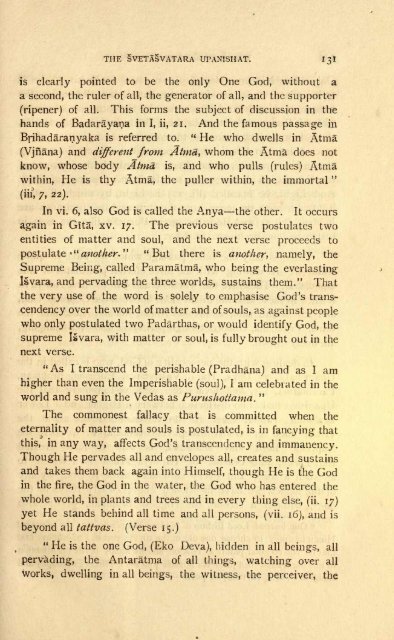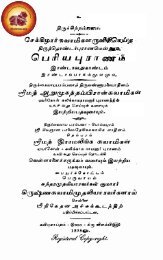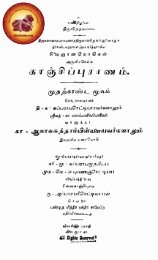- Page 5:
t r STUDIES IN SAIVA-SIDDHANTA
- Page 9:
CONTENTS. J. M. NALLASVAMI PILLAI .
- Page 15 and 16:
" INTRODUCTION. THE assemblage
- Page 17 and 18:
INTRODUCTION 111 European Sanskriti
- Page 19 and 20:
INTRODUCTION V in a new perspective
- Page 21 and 22:
INTRODUCTION Vll or directness of a
- Page 23 and 24:
INTRODUCTION 1*X a heart within him
- Page 25 and 26:
INTRODUCTION XI divisions and compo
- Page 27 and 28:
>is governed INTRODUCTION Xl
- Page 29 and 30:
" " INTRODUCTION XV The A
- Page 31 and 32:
FLOWEE AND FEAGEANCE. A FLORAL WREA
- Page 33 and 34:
" My " FLOWER AND FRAGRAN
- Page 35 and 36:
THE LIGHT OF TROTH OK UNMAI VILAKKA
- Page 37 and 38:
UNMAI VILAKKAM. 7 lotus-eyed Vishnu
- Page 39 and 40:
" As " Out UNMAI VILAKKAM
- Page 41 and 42:
IJNMAI VILAKKAM. II 43. If this bea
- Page 45 and 46:
THE HOUSE OF GOD. "YE ARE THE
- Page 47 and 48:
THE HOUSE OF GOD, 1$ words are ambi
- Page 49 and 50:
THE HOUSE OF GOD. I? heart melted i
- Page 51 and 52:
" " " " "
- Page 53 and 54:
" AN ANOTHEB SIDE. We refer to
- Page 55 and 56:
AN ANOTHER SIDE. 23 the word occurs
- Page 57 and 58:
" " That " Kant &quo
- Page 59 and 60:
" AN ANOTHER SIDE. 2J antecede
- Page 61 and 62:
" AN ANOTHER SIDE. 29 but the
- Page 63 and 64:
" The ." Since " AN
- Page 65 and 66:
" To " " When "
- Page 67 and 68:
~>m THE TATTVAS AND BEYOND.
- Page 69 and 70:
THE TATTVAS AND BEYOND. 37 and more
- Page 71 and 72:
TATTVAS AND BEYOND. 39 Prakrit!) is
- Page 73 and 74:
" The TATTVAS AND BEYOND. 4! e
- Page 75 and 76:
THE NATURE OF THE DIVINE PERSONALIT
- Page 77 and 78:
" There " THE NATURE OF T
- Page 79 and 80:
THE NATURE OF THE DIVINE PERSONALIT
- Page 81 and 82:
THE NATURE OF THE DIVINE PERSONALIT
- Page 83 and 84:
" When " " and is th
- Page 85 and 86:
" These " There VOWELS AN
- Page 87 and 88:
VOWELS AND CONSONANTS. 55 possible,
- Page 89 and 90:
VOWELS AND CONSONANTS. 57 duality i
- Page 91 and 92:
" VOWELS AND CONSONANTS. 59 or
- Page 93 and 94:
VOWELS AND CONSONANTS. 6 1 mere ope
- Page 95 and 96:
" GOD AND THE WOKLD THE ADVAIT
- Page 97 and 98:
GOD AND THE WORLD. 65 and asat. We
- Page 99 and 100:
GOD AND THE WORLD. 6/ and the Tayum
- Page 101 and 102:
GOD AND THE WORLD. 69 it is joined.
- Page 103 and 104:
" THE TWO GEMS (SAT AND SAT-AS
- Page 105 and 106:
THE TWO GEMS. 73 soul regains its o
- Page 107 and 108:
" < whence THE TWO GEMS
- Page 109 and 110:
" itself. TJie wood of the toy
- Page 111 and 112: -. -f> " L> &quo
- Page 113 and 114: Behold " SOME ASPECTS OF THE G
- Page 115 and 116: " Be " a^sar " "
- Page 117 and 118: " SOME ASPECTS OF THE GOD-HEAD
- Page 119 and 120: " " " " SOME AS
- Page 121 and 122: SOME ASPECTS OF THE GOD-HEAD. 89 th
- Page 123 and 124: " He SOME ASPECTS OF THE GOD-H
- Page 125 and 126: " " Mind " " &q
- Page 127 and 128: " He " He " " G
- Page 129 and 130: " Thou " " " &q
- Page 131 and 132: ASHTAMUHURTAM. 99 effect freedom fr
- Page 133 and 134: > ASHTAMUHURTAM . I O I O Th
- Page 135 and 136: ASHTAMUHURTAM. 103 As Earth, Water,
- Page 137 and 138: " how " " One "
- Page 139 and 140: " O " This " "
- Page 141 and 142: " " " THE SVETASVATA
- Page 143 and 144: THE bVETAbVATARA UPANISJIAT. I IT R
- Page 145 and 146: " THE SVETASVATARA UPANISHAT.
- Page 147 and 148: THE SVETASVATARA UPANISHAT. 115 How
- Page 149 and 150: " " THE SVSTASVATARA UPAN
- Page 151 and 152: " The " THE SVETAbVATARA
- Page 153 and 154: 121 two things held apart and broug
- Page 155 and 156: " Prachchanna THE SVETA5VATARA
- Page 157 and 158: " Know THE SVETASVATARA UPANIS
- Page 159 and 160: " This " THE SVETASVATARA
- Page 161: " He " " THE SVETASV
- Page 165 and 166: " Adore " THE SVETASVATAR
- Page 167 and 168: " He " THE &VETASVATARA U
- Page 169 and 170: " THE SVETAVATARA UPANISHAT. 1
- Page 171 and 172: " Why " THE SVETASVATARA
- Page 173 and 174: " From " " " On
- Page 175 and 176: " " THE SVETASVATARA UPAN
- Page 177 and 178: " " THE SVETASVATARA UPAN
- Page 179 and 180: A CHAPTER FROM THE KURAL. 147 agree
- Page 181 and 182: A CHAPTER FROM THE RURAL. 149 no de
- Page 183 and 184: A CHAPTER FROM THE RURAL, !$! natur
- Page 185 and 186: A CHAPTER FROM THE RURAL. 153 the T
- Page 187 and 188: A CHAPTER FROM THE RURAL. 155 PARIM
- Page 189 and 190: A CHAPTER FROM THE RURAL. 157 see S
- Page 191 and 192: THE ANALOGIES IN THE GITA. Analogy
- Page 193 and 194: THE ANALOGIES IN THE GlTA. l6l difl
- Page 195 and 196: " favourite and hackneyed THE
- Page 197 and 198: " THE ANALOGIES IN THE GITA. 1
- Page 199 and 200: " As " " THE ANALOGI
- Page 201 and 202: " "THE UNION OF INDIAN PH
- Page 203 and 204: THE UNION OF INDIAN PHILOSOPHIES. I
- Page 205 and 206: " THE UNION OF INDIAN PHILOSOP
- Page 207 and 208: THE UNION OF INDIAN PHILOSOPHIES. 1
- Page 209 and 210: THE UNION OF INDIAN PHILOSOPHIEStre
- Page 211 and 212: THE UNION OF INDIAN PHII.OSOPHIIS,
- Page 213 and 214:
" THE UNION OF INDIAN PHILOSOP
- Page 215 and 216:
THE UNION OF INDIAN PHILOSOPHIES. 1
- Page 217 and 218:
" Unto " " " Ye
- Page 219 and 220:
TREK OF KNOWLEDGE OF GOOD AND EVIL.
- Page 221 and 222:
*""*" TREE OF KNOWLE
- Page 223 and 224:
TREE OF KNOWLEDGE OF GOOD AND EVIL.
- Page 225 and 226:
TREE OF KNOWLEDGE OF GOOD AND EVIL.
- Page 227 and 228:
TREE OF KNOWLEDGE OF GOOD AND EVIL.
- Page 229 and 230:
TREE OF KNOWLEDGE OF GOOD AND EVIL.
- Page 231 and 232:
" <*?,<* TREE OF
- Page 233 and 234:
TREE OF KNOWLEDGE OF GOOD AND EVIL.
- Page 235 and 236:
" " THE FOUR PATHS. 2OJ D
- Page 237 and 238:
" Those " " Satyam T
- Page 239 and 240:
" " The " He "
- Page 241 and 242:
" THE FOUR PATHS. 2O9 either a
- Page 243 and 244:
" THE FOUR PATHS. 211 Who thin
- Page 245 and 246:
: THE FOUR PATHS. 21 3 Those who ha
- Page 247 and 248:
" " THE FOUR PATHS. 2I 5
- Page 249 and 250:
THE FOUR PATHS. 217 DO benefit as i
- Page 251 and 252:
The easy duties, THE FOUR PATHS, 21
- Page 253 and 254:
" A " Yc " " TH
- Page 255 and 256:
THE PEKSONALITY OF GOD ACCORDING TO
- Page 257 and 258:
" THE PERSONALITY OF GOD. 225
- Page 259 and 260:
" " The THE PERSONALITY O
- Page 261 and 262:
" THE PERSONALITY OP GOD. 229
- Page 263 and 264:
" He " " Not "
- Page 265 and 266:
" Here " There There &quo
- Page 267 and 268:
" His " But " "
- Page 269 and 270:
" The " THE PERSONALITY O
- Page 271 and 272:
" " " THE PERSONALIT
- Page 273 and 274:
" When " The " Perso
- Page 275 and 276:
" THE PERSONALITY OF GOD. 243
- Page 277 and 278:
" We " Oh " " A
- Page 279 and 280:
ADVAITA ACCORDING TO THE bAIVA SIDD
- Page 281 and 282:
J<( ADVA1TA ACCORDING TO THE
- Page 283 and 284:
Mind ADVAITA ACCORDING TO THE SAIVA
- Page 285 and 286:
ADVAITA ACCORDING TO fHF. S.AIVA SI
- Page 287 and 288:
" What " ADVA1TA ACCORDIN
- Page 289 and 290:
" " As ADVAITA ACCORDING
- Page 291 and 292:
" Whatever " He " &q
- Page 293 and 294:
as ADVAITA ACCORDING TO THE &AIVA S
- Page 295 and 296:
" But " " " &qu
- Page 297 and 298:
" " From " " Hi
- Page 299 and 300:
ADVAITA ACCORDING TO THE SAIVA SIDD
- Page 301 and 302:
" The ADVAITA ACCORDING TO THE
- Page 303 and 304:
ADVAITA ACCORDING TO THE SAIVA SIDD
- Page 305 and 306:
" The THE SAIVA KELIGION AND S
- Page 307 and 308:
" " " We " &quo
- Page 309 and 310:
" THE SAIVA RELIGION. 2/7 and
- Page 311 and 312:
1 and " THE bAIVA RELIGION. 27
- Page 313 and 314:
" Brahman THE SAIVA RELIGION.
- Page 315 and 316:
" He and " He " He T
- Page 317 and 318:
" *" " He " &qu
- Page 319 and 320:
The THE SAIVA RELIGION. 287 same ma
- Page 321 and 322:
" And " THE SAIVA RELIGIO
- Page 323 and 324:
" " Wherefore " THE
- Page 325 and 326:
" Wherefore " * " TH
- Page 327 and 328:
< rr The Dr. Ananda K. THE M
- Page 329 and 330:
" Owing ; * " " The
- Page 331 and 332:
" " " THE SAIVA RELI
- Page 333 and 334:
" Thou THE SAIVA RELIGION 30 1
- Page 335 and 336:
" THE SA1VA RELIGION. 303 Ligh
- Page 337 and 338:
" This " THE SAIVA RELIGI
- Page 339 and 340:
THE SAIVA RELIGION. 307 away as an
- Page 341 and 342:
1 " As " From " THE
- Page 343 and 344:
THE SAIVA RELIGION. 311 Atma does n
- Page 345 and 346:
" " THE SAIVA RELIGION. 3
- Page 347 and 348:
THE AIVA RELIGION. 315 in any langu
- Page 349 and 350:
" " The THE NATURE OF THE
- Page 351 and 352:
" The " " But THE NA
- Page 353 and 354:
THE NATURE OF THE J1VA. 321 St. Tir
- Page 355 and 356:
THE NATURE OF THE JlVA. 323 bodily
- Page 357 and 358:
" " THE NATURE OF THE jlV
- Page 359 and 360:
" Advaita " THE NATURE OF
- Page 361 and 362:
" A " " " "
- Page 363 and 364:
" O THE NATURE OF THE JIVA. 33
- Page 365 and 366:
THE NATURE OF THE JIVA. 333 everyth
- Page 367 and 368:
" As " " This "
- Page 369 and 370:
" " THE NATURE OF THE J1V
- Page 373 and 374:
" The " SRI PARVATAM. 339
- Page 375 and 376:
" As SRI PARVATAM. 34! ravine
- Page 377 and 378:
SRI PARVATAM. 343 Mahabalipuram) an
- Page 379 and 380:
SRI PARVATAM. 345 ancient Sculpture
- Page 381 and 382:
" SAIVAISM IN ITS RELATION TO
- Page 383 and 384:
" SAlVAiSM IN ITS RELATION TO
- Page 385 and 386:
SAIVAISM IN ITS RELATION TO OTHER S
- Page 387 and 388:
" To SAIVAISM IN ITS RELATION
- Page 389 and 390:
" " SAIVAISM IN ITS RELAT
- Page 391 and 392:
" Sabash " A " "
- Page 393 and 394:
SAIVAISM IN ITS RELATION TO OTHER S





